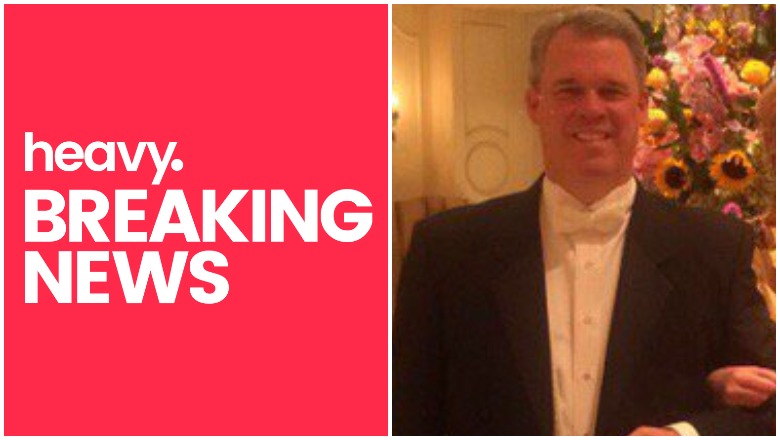
Twitter Hollerith
Randolph Marshall Hollerith, Dean of the Washington National Cathedral, will be playing a significant role in John McCain’s funeral service today. According to the official program, he will be giving the welcome at the beginning, the Collect for Burial, the Prayer for Those Who Grieve, the Commendation, and the Dismissal at the end. Here is what you need to know about Randy Hollerith.
1. He’s an American Episcopal Priest Who Was Named the 11th Dean of the Washington National Cathedral in 2016
Hollerith, an American Episcopal priest, was named the 11th Dean of the Washington National Cathedral in August 2017. The National Washington Cathedral is the seat of the Presiding Bishop of the Episcopal Church. It’s known as a national church that is dedicated to serving the entire country. The Cathedral is the sixth largest cathedral in the world and the second largest in the U.S., Newsweek reported.
Hollerith said in a statement about the Cathedral: “The cathedral is not only a place of immense beauty and grandeur, but it plays an important role in proclaiming the reconciling love of Christ within this city and around our country.”
Hollerith graduated from St. Stephen’s and St. Agnes School in Alexandria, Virginia, Denison University. His Master of Divinity is from Yale Divinity School.
Before his current position as dean of the Washington National Cathedral, Hollerith was rector of St. James’ Episcopal Church for 16 years. While there, according to Saint Judes, he doubled the parish budget, expanded the church’s outreach ministries, and helped grow the largest mission program in the Diocese of Virginia.
Before St. James, Hollerith was rector of St. Peter’s Episcopal Church in Savannah, Georgia and assistant rector of St. Stephen’s Episcopal Church in Richmond.
2. Hollerith’s Great Grandmother Witnessed Teddy Roosevelt Lay the Cathedral’s Foundation Stone
Hollerith grew up in Alexandria, Virginia. As a boy, he often visited the Washington National Cathedral as a boy, Saint Judes shared. His great grandmother witnessed President Theodore Roosevelt lay the foundation stone for the Cathedral in 1907.
3. Randy Hollerith’s Wife, Melissa Hollerith, Is Also an Episcopal Priest
Hollerith’s wife, Melissa Hollerith, is also an Episcopal priest. She’s chaplain of St. Christopher’s School in Richmond, Virginia, Saint Judes reported. In 2015, the Obama White House sent her an invitation to welcome Pope Francis to the United States during his first full day in the country. It was in response to a letter she wrote the White House after she was touched by then-President Barack Obama’s eulogy for Rev. Clementa Pinckney, one of the nine people shot and killed at Charleston’s Emanuel African Methodist Episcopal Church, Richmond Magazine reported.
She’s also a cancer survivor, according to her Twitter account, and she and Randall are proud parents of a son and daughter.
The Holleriths have a black Lab named Lady who often is at the Cathedral with Hollerith while he works.
And other pets that they love.
4. He Urged Readers to Challenge Oppression & Confront Injustice Just Like MLK
In March, Hollerith wrote that Rev. Dr. Martin Luther King Jr.’s last sermon was just as relevant today as it was in 1968, United Methodist Insight shared. He wrote: “His words delivered that Sunday morning are as alive and relevant today as they were a half-century ago. And they have helped shape this cathedral’s work on social justice and racial reconciliation ever since.” He shared how King urged the people hearing his sermon to not yield to the temptation to wait for someone else to do the hard work or put themselves on the line.
“King’s challenge to the cathedral in 1968 feels eerily relevant today,” Hollerith wrote. “On issues of gun violence, racism, economic inequality or immigration, our human instinct is to not offend. We wait for others to act. We prefer to hit the snooze button than to remain, as King said, ‘awake through a great revolution.’ But as Christians, we follow a man, Jesus, who never took the easy way out. Jesus did not censor himself for fear of retribution. He challenged the institutional oppression of his day, and calls us to confront the injustices of our own time.”
5. Hollerith Led the National Prayer Service after Trump’s Inauguration, But Has Spoken Out Against Trump on Numerous Occasions Since
Hollerith led the national prayer service at the Washington National Cathedral the day after President Donald Trump’s inauguration in January 2016. He explained to Newsweek that this wasn’t so much a prayer service for the President as it was for the entire nation. Since that day, Hollerith has spoken out against Trump on a number of occasions, Newsweek shared. A week after the prayer service, he condemned an executive order to end a refugee resettlement program. He wrote: “Trump’s actions are a challenge to the conscience of all Americans and people of goodwill. This deeply troubling action is grounded in paranoia and fear of the stranger, and threatens to fracture families and unfairly penalize millions of innocent people. It is as un-American as it is un-Christian.”
Then in May 2016, he criticized an order that sought not to penalize religious entities engaging in political activity. And in June, he spoke about the troubling gun violence epidemic. In July, he criticized a decision by Trump to ban transgender service members from the military, saying that did not advance Christian values. After the Charlottesville tragedy, he said the nation was failing to take the “cancer of white supremacy” seriously.